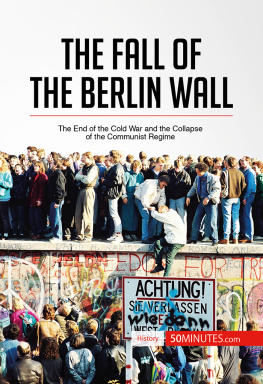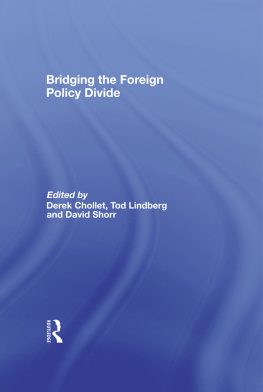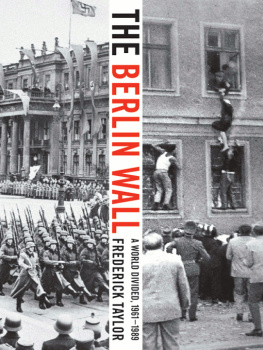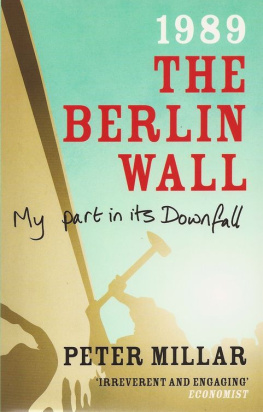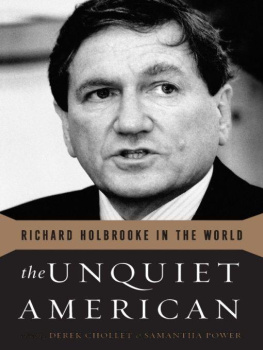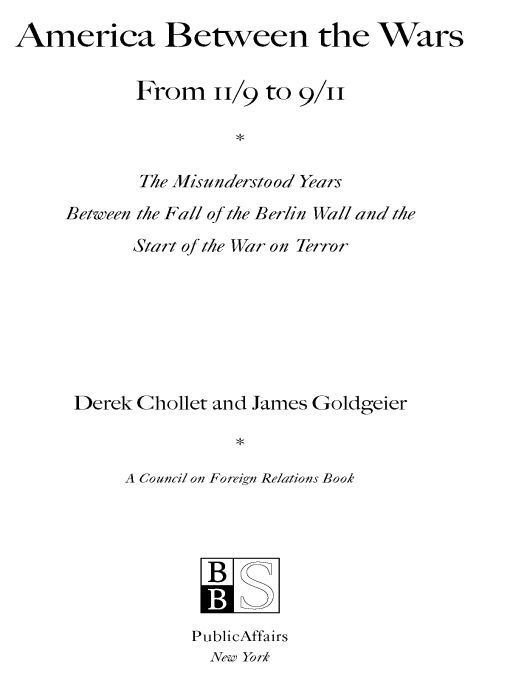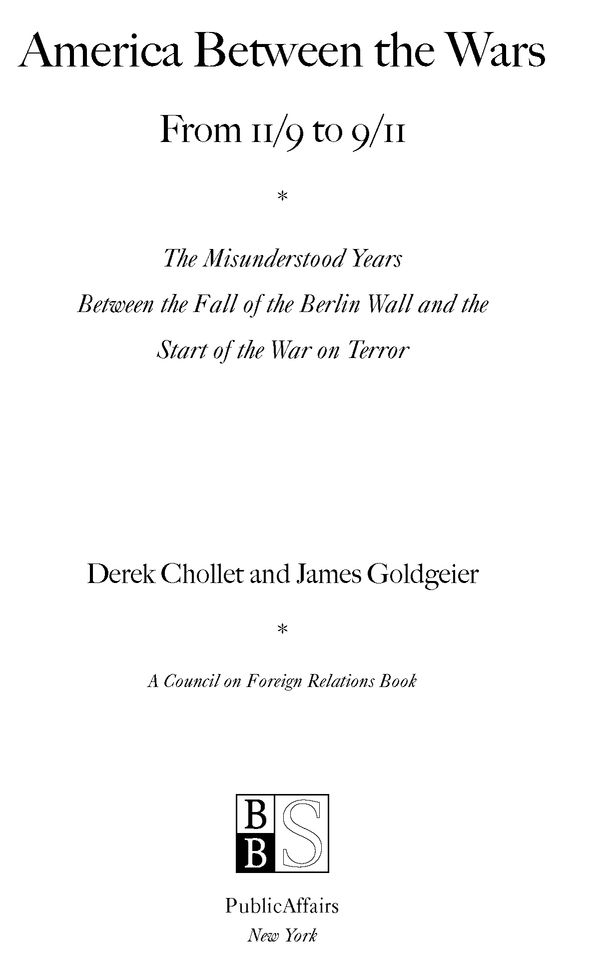Table of Contents
Praise for America Between the Wars
An indispensable history of the decade preceding 9/11. You cant understand todays American crisis without understanding how we got there. This book tells us, eloquently and compellingly.
Richard Holbrooke
This book will likely stand as the definitive work on the politics, people, and ideas involved in the foreign policy debates of the 1990s. It shows how, in the decade before Sept. 11, both Republicans and Democrats, both liberals and conservatives, struggled to come to grips with post-Cold War issues such as the use of military force, the promotion of democracy, and the proper U.S. role in the world. This is a lucidly written history, devoid of rhetoric and full of invaluable information.
James Mann, author of Rise of the Vulcans
America Between the Wars is a deeply researched, well-written account of U.S. foreign policy in the first post-Cold War decade. Authors Chollet and Goldgeier should be commended for being comprehensive and fairminded . Truly essential reading.
Douglas Brinkley, professor of history at Rice University and
fellow at the James A. Baker III Institute for Public Policy
Here is an excellent account of how the United States and the world changed from the conclusion of the Cold War to the Al Qaeda attacks of 2001. The history of diplomacy and international affairs are inseparable from the history of politics; but it is extremely difficult to do them all justice in a single book. Derek Chollet and James Goldgeier not only succeed, they succeed in styleand they provide a persuasive and entirely original way of understanding Americas role in global affairs during a pivotal dozen years.
Sean Wilentz, professor of history at Princeton University
and author of The Age of Reagan
In America Between the Wars, Goldgeier and Chollet examine the decade between the collapse of the Soviet Union and the destruction of the Twin Towers and offer illuminating insights into the forces that have reshaped todays world.
Henry Kissinger
This book is a gem of current history, a scrupulously fair and highly readable piece of old-fashioned scholarship. Chollet and Goldgeier, two of the most promising young foreign policy experts, now allow us to argue about the ten-year run up to 9/11 and know what were talking about.
Leslie H. Gelb, former New York Times columnist
and president emeritus of the Council on Foreign Relations
Chollet and Goldgeier have written a highly informative, engaging, and accessible account of the period between Americas most recent major warsthe Cold War and the War on Terror. In this balanced and well-written story, they argue that 9/11 did not change everything and that in order to analyze Americas challenges today, one must understand the foreign policy debates and clashes of the 1990s.
Lee H. Hamilton, president and director of the
Woodrow Wilson International Center for Scholars and
vice-chair of the 9/11 Commission
ALSO BY DEREK CHOLLET
The Road to the Dayton Accords: A Study of American Statecraft
Bridging the Foreign Policy Divide
(coeditor with Tod Lindberg and David Shorr)
Too Poor for Peace?
(coeditor with Lael Brainard)
ALSO BY JAMES GOLDGEIER
Leadership Style and Soviet Foreign Policy
Not Whether But When: The U.S. Decision to Enlarge NATO
Power and Purpose: U.S. Policy toward Russia after the Cold War
(with Michael McFaul)
FOR OUR FUTURE:
Lucas Chollet Hostetter
and
Jeffrey Goldgeier and Brian Goldgeier
PREFACE
Between the Wars
IN MARCH 1995, more than five years after the Berlin Wall fell and the Cold War ended, the New York Times Week in Review section invited readers to name the era in which they were living. Writer James Atlas opened the contest by opining that the term post-Cold War era was tentative, vague; it lacks authority. He complained that the tepid label we reflexively invoke these days carries a suggestion of self-doubt. Its as if our own historical moment is somehow after the fact, overshadowed by the more significant era that preceded it. Atlas himself tried to guess which event historians would use to define the periodperhaps carnage in the Balkans, the rise of Islamic fundamentalism, or the unraveling of European unity.
Reporting readers answers a few weeks later, the Times said the majority of respondents were male and extremely pessimistic. Popular labels included the Age of Anxiety, Age of Uncertainty, Age of Fragmentation, Age of (Great and Failed) Expectations, and Age of Disillusion (and Dissolution). One reader from New York suggested the Cold War Lite Erain tribute, to all those Bills, Newts, and Phils who want a strong defense but didnt get around to serving, and to all those global skirmishes that are morally appalling and complex but lack a clear embodiment of evil like Hitler or Communism. From Greenwich High School in Connecticut came the Era of the New Meanies. And one wag from Santa Monica offered the Age That Even Historians from Harvard Cant Name.
Five years later, the magazine Foreign Policy, a staple of elite reading in Washington, took its own stab at the problem, asking leading lights in the field of international affairs to submit essays naming the new era. Christoph Bertram, a longtime observer of the United States and director of one of Germanys leading think tanks, wrote that those living in the Renaissance or Enlightenment had no idea they lived in such times and suggested we were in the Era of the Interregnum, an age that cannot last. Author Robert Wright, whose book on globalization, Nonzero (connoting a world of possible win-win outcomes), was a favorite of Bill Clintons, trotted out Pax Kapital. Wright sheepishly noted that he had suggested the name back in 1989, at the start of the era, but it never stuck. From Kings College in Cambridge, Emma Rothschild offered the Age of Insubordination. We lived, she said, in a postrevolutionary universe... more free of the fear of violent revolution than at any time since the 1790s.
None of these ideas took hold. These authors and others who tried their hand at the name game throughout those years suffered from not knowing what was to come. Events have a way of framing history with beginnings and endings, revealing trends and clarifying moments. These are hard to perceive, except in hindsight. Looking back, we can see that, for many, the era of uncertainty and opportunity that began with the fall of the Berlin Wall on November 9, 1989, or 11/9, ended violently on September 11, 2001, the day known in America simply as 9/11.
FOR GEORGE W. BUSH, the world changed completely on that fateful day, and in his second inaugural address, he described the era that people had struggled to comprehend. After the shipwreck of communism, the president declared on January 20, 2005, came years of relative quiet, years of repose, years of sabbaticaland then there came a day of fire.
Years of repose, years of sabbatical. The United States, the president asserted, was naively complacent in the 1990s, off duty, asleep at the switch. Its leaders squandered an opportunity to make the world safer. These phrases suggest that different decisions during these years could have not only prevented 9/11 but also created a new global order. They were not just a comment, but an argument, says Michael Gerson, Bushs acclaimed speechwriter. They suggest that there was a surface calm amidst a series of emerging existential threats that had not been adequately confronted.


